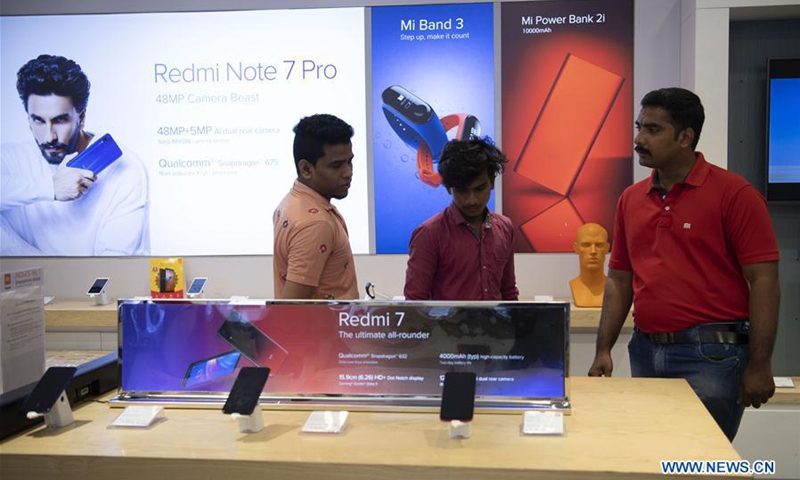SOURCE / INDUSTRIES
India’s 5G solution ‘unlikely’ homegrown: analysts

Customers are seen at a store of Chinese technology company Xiaomi in Chennai, India, Oct. 8, 2019. (Xinhua/Lui Siu Wai)
India's homegrown 5G solution, announced by the country's richest man, Mukesh Ambani, is unlikely to be entirely a domestic effort, Chinese telecom analysts said Monday.
Indian tycoon, Mukesh Ambani, chairman of Reliance Industries Ltd, announced last week that the company's digital arm Jio has developed a complete homegrown 5G solution "from scratch," the Press Trust of India reported.
It is reported that the solution may be ready for field deployment next year, as soon as the 5G spectrum is available.
The news has generated some interest in China, the world's leading nation in 5G technology, given India's hostile approach toward Chinese technology firms, including Huawei.
Chinese analysts said that it is unlikely that the said Indian 5G solution is an entirely homegrown Indian effort.
An industry insider told the Global Times Monday that the progress announced by Jio could be based on open radio-access networks (open RAN) technology, given its partnership with Google Inc. But it is impossible for it to be a wholly innovative technology built solely by India, the insider said.
Established in 2018, open RAN cuts back on propriety hardware. This trait allows users to bypass companies that own propriety hardware.
Xiang Ligang, China's telecoms industry analyst, said it's "boasting rather than anything real," noting that the so-called 'Made in India' 5G solution lacks solid details for anyone to believe.
"It's very difficult to develop a 5G system 'from scratch' independently, if it's that easy, Huawei would not find it that difficult to ban," Xiang said.
Indian media reports said that Huawei could be banned from participating in India's 5G network rollout, months after it was given the green light to participate in the country's trials for the technology.
The Indian government also blocked 59 Chinese apps such as TikTok and WeChat, citing so-called national security reasons.
Analysts noted that India is not yet ready for a wide application of the latest 5G technology since "3G and 4G has not matured in the country." Moreover, any ban on the Chinese firm would directly result in rising costs since India has limited domestic expertise in telecoms equipment manufacturing.
India has delayed a planned 5G spectrum auction until 2021, according to a report by the Indian Express.
In January, Vietnamese firm Viettel raised eyebrows after it declared that it had mastered 5G technology after just six months of work.
Zhou Rong, a senior research fellow at the Chongyang Institute for Financial Studies at the Renmin University of China, said despite the progress made by Jio, it would be very difficult for India to imitate China's success in 5G.
"India's strength lies in its global management teams, as many Indians head multinational companies, but to learn and master a new technology requires collective strength," Zhou said, noting that weakness in its collective power is demonstrated by India's poor Olympic gold medal record.
The country has only collected one gold medal since 1980, according to media reports.



